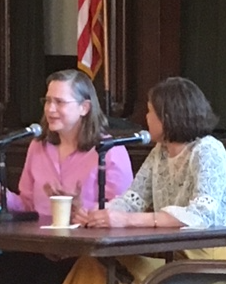The questions Robin Sitten and I got from our audience at the Perkins School for the Blind Thursday sure were thought-provoking. Here’s a sampling:

Robbin and I during our presentation.
- Did you write your memoir Long Time, No See as therapy, or did you write it to share your journey with others?
- The people who sign up for your memoir classes, do you think they take it just because you’re blind and they want to, like, watch how you do it?
- A lot of times when people lose their sight, their marriages end, too — I know that happened to a lot of people here. I’m so glad Michael is here, I read about him in your books and I just think he is grrrrreat! and I’m wondering, can you tell us more about what Mike is like, and also, what you guys had to do to stay together?
- We hear a lot about how technology is so good for us, you know, text to speech and all that, but do either of you have examples of ways all the apps and stuff are making things more difficult?
Answers to those first three questions require far more words than I can fit into one blog post today – how about I use those questions as topics for future posts? We can tackle the fourth question here, though, thanks to Robin Sitten, the narrator of the audible.com version of Writing Out Loud. Robin was presenting with me on Thursday, and she was kind enough to take that one on for the two of us.

That’s Keller as in Helen, and Sullivan as in Annie…Perkins has quite a history.
Hearing an Audible.com narrator’s perspective on text-to-speech technology was, ahem, eye-opening. Robin explained that advances in text-to-speech technology means computer voices are starting to sound much more human. “Those advances are eventually going to eliminate my job as a narrator,” she said with a shrug. “But that’s not all bad.” She described her love for books, and then told an audience full of Braille and audio-book readers what a privilege it is to read out loud for others. “I mean, I narrated Beth’s book for her, and you can all hear it now, which is great,” she said. “But it’s not available in Spanish, or Chinese, or Japanese or any other language.” From there she described advances in technology that make translations of text to other languages easier than ever before. “That means pretty soon people all over the world who can’t read print can have more books available to them.”
A lot of the people who came up to ask more questions after the presentation complimented us on how comfortable we seemed up there on stage together. “How long have you two known each other?” one asked. Robin told her we’d communicated by email and twitter before now but had just met face-to-face for the first time that afternoon. “Just this afternoon?” the audience member marveled. “It seems like you’ve known each other a long, long time.” You know what? It really did.
As for question #2, Beth, you probably don’t need any coaching from the peanut gallery, but here’s my 2 cents: I absolutely did not care about your being blind; you’re being a good editor and teacher, as demonstrated in that first class you invited us to here at the Admiral, was what won me over.
YOU are teaching me a LOT!!!!
Question 2 is pretty perverse, in my opinion. Are there, in fact, people who are “voyeurs of the disabled?” That’s what the questioner suggests. “Wanting to watch, like, how you do it.” It’s not as though teaching is a para-Olympic event. What’s your reaction to that question?
The question surprised me. I had to pause a second before answering, and in that quick second I remembered that the young woman asking it is blind.
Aha! That realization left me regarding the question in an entirely different way.
I told the audience that after losing my sight I developed a sort of paranoia. I sometimes think people are watching me. If my Seeing Eye dog makes a wrong move and I have to correct her, I’m sure EVERY eye is on us. When I fumble to find a doorknob, I think passers-by are watching. I guessed that the woman asking the question might feel the same way.
I told her that in order to get the answer to her question, we’d have to ask the writers who take my memoir class. So far only two of them have come right out and told me they signed up after hearing that the teacher is blind, and those two are among my favorites: 98-year-old Hannelore, and 95-year old Wanda. Hanna has some sight loss due to macular degeneration. She told me that when she heard someone at Blind Service Association talking about me leading a class, she wanted “to see how a blind lady teaches writing.” Wanda heard about the class from a high school pal of hers named Minerva, who was taking my class at the time. “I thought, holy Toledo, how in the sam hill is she going to teach writing?” Wanda has been in my class for 12 years now.
I told the audience Thursday about those two writers, and I also told them that from what I understand, many of the writers keep signing up to class because they have come to appreciate the methods I use to lead the class – the way everyone in class reads their pieces aloud and the way my method of teaching values the art of listening.
A lot of them like the way I edit, too.
Thanks for this, Beth. When I taught memoir writing to my ESOL high school students, their own reading of their pieces aloud, in small groups and, ultimately, to the large group, was the highlight of the semester. Listening, the least taught but most precious of the four communication skills (in my opinion), was as honed as was the writing for each of the students.
I had not considered that a blind person might be thinking that she was being looked at all the time. That certainly puts the question into an entirely different frame. And Hanna’s and Wanda’s candor makes that slightly paranoid idea not so paranoid after all.
Fascinating but not terribly surprising difference in the questions.
Agree. I wasn’t surprised by the questions, really, but found it interesting when I thought about all of them as a “package” later.
Leave a Response